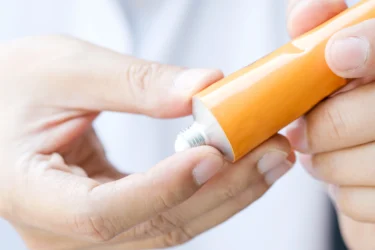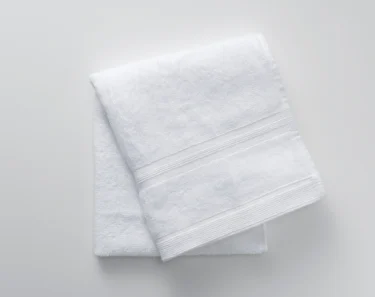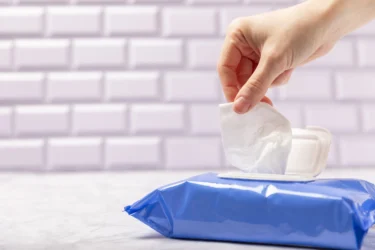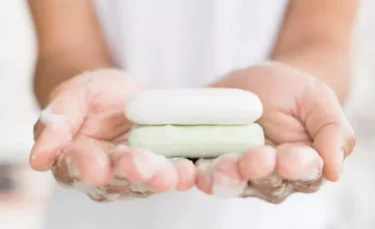How to Stop Itchy Anus at Night: Effective, Research-Backed Solutions
By Dr. Nayana Shetty +2 more

Get,

to manage your symptom
Get your,


4 Cr+ families
benefitted

OTP sent to 9988776655



You’ve successfully subscribed to receive
doctor-approved tips on
Whatsapp

Get ready to feel your best.

Hi There,
Download the PharmEasy App now!!


Register to Avail the Offer
Send OTPBy continuing, you agree with our Privacy Policy and Terms and Conditions

Hi There,
Sign up on PharmEasy now!!
Trusted by 4 crore+ families

OTP sent to 9988776655



You have unlocked 25% off on medicines




Code: NU25
By Dr. Nayana Shetty +2 more
Table of Contents
We’ve all experienced an itchy bottom at some point. This annoying symptom is even more aggravating at night when you’re trying to sleep. Wondering what makes your behind itch while you’re off to dreamland? Knowing what’s causing it and how to modify your habits can play a big role in getting rid of it. In this article, we’ll take a look at how to get rid of itchy anus at night and research-backed measures to tackle this problem so that you don’t have to lose your sleep over the itchy bottom anymore3!

Did you know?
Do you wonder what causes an itchy anus? To get rid of an itchy bottom, figuring out the root cause is crucial. There could be several reasons behind your discomfort, some serious, others not so much. Let’s delve into the possible causes.
Cleanliness plays a big role in having an itch-free bottom. Over-cleaning, under-wiping, or the use of harsh soaps may potentially irritate the sensitive skin around your anus, leading to itching.
Swollen veins (haemorrhoids) and small tears (anal fissures) near the rectum can cause discomfort, such as itching. If you think these conditions may be the reason you are facing itching issues, consult your healthcare provider to guide you to the right treatment.
Did you know certain foods and drinks may trigger anal itching? Usual suspects include spicy or acidic food, alcohol, caffeine, and dairy. A balanced diet without trigger foods may bring relief from the itching.
Sweating leads to trapped moisture around your anal area1. This may lead to itching, more so at night when there’s no fresh air circulation.
Certain medications might list itching as a side effect. If you’re taking any medicines before bedtime, ask your healthcare provider if these could be causing your itchiness.
The choice of your underwear fabric affects comfort around your bottom. Tight synthetics can trap moisture and irritate the skin. Loose and breathable cotton underwear can prevent sweat trapping and itching.
Threadworms are small parasitic worms that infect your gut and lay eggs around your anus. This can cause itching, especially at night. This condition is common in both children and adults. If you feel that your itchy anus is due to worms, consulting a health professional is crucial.
Skin issues like eczema or psoriasis could be the culprits. If you have one of these long-term skin conditions that affect the skin around your anus, getting it treated by your healthcare provider can soothe the itching at night.
Women may find that their bottoms itch during menstruation due to extra moisture. Using high-absorbency pads or menstrual cups probably could ease the irritation at night.
Kids can also experience itchy anuses at night. The main suspects are threadworms, poor cleanliness, and sharing toys.
In children, especially if much of the itching occurs at night and keeps your child awake, a pinworm infestation is likely the cause. If they have just started wetting the bed, that could also be due to pinworms irritating the urethra.
Dr. M.G. Kartheeka, MBBS, MD(Paediatrics)
Now that you know the causes, let’s look at treatment options for how to get rid of itchy anus at night. Getting relief depends on what’s causing the itching. A combination of self-care and specific treatments usually fetches the best results.

Quick relief can come from over-the-counter creams that may be recommended by your healthcare provider.
If itching doesn’t reduce or becomes severe, contact your healthcare provider. They may prescribe stronger ointments, try to identify the specific cause, and provide treatment tailored to the cause4.

Choosing soft, breathable cotton undies and pyjamas may ward off sweating and keep annoying irritation at bay2.

Keeping your sleeping area cool may help avoid excessive sweating. Try a cooler room temperature and use light sheets that let your skin breathe.

Effective ways to keep your anal area clean and irritation-free are readily available2. The proper wiping techniques, avoiding harsh soaps and wipes, and keeping the area cool and dry could all potentially reduce itching.

After going to the toilet, clean up softly and thoroughly. You can use unscented tissues, moist wipes, or a bidet for a gentle and thorough clean. Women must be careful and always clean from front to back.

Choose gentle soaps and avoid scents or medicinal ones as they can make the itchiness worse2.
More than 100 different causes for pruritus ani have been reported and the condition is 4 times more common in males than in females. While pregnant, females have a higher disposition for developing itching in the anal region due to hormonal changes and possible haemorrhoids or fissures, which require a thorough examination and management.
Dr. Ashish Bajaj, M.B.B.S., M.D. in Clinical Pharmacology and Toxicology
It’s critical to see a healthcare provider if self-help does not fix the issue or if you notice other worrying signs:
Managing the issue that’s behind your itchy anus at night is key. You can incorporate some of these precautions into your daily routine to keep your skin comfortable. Here are some overall tips:
Also Read: Difference between Piles vs Fissure
In conclusion, fixing an itchy anus at night is about finding the root of the issue and then applying proven solutions. The problem might feel irritating and slightly embarrassing, but taking action can drastically improve your life. When self-care doesn’t help, always contact your healthcare provider.
Find out what’s causing the itchiness and treat it. Quick fixes could include topical aids, better hygiene methods, and changes in lifestyle.
Trapped moisture and the absence of other distractions can make the itchiness seem worse at night.
Keeping the area clean, wearing clothes that let your skin breathe, and having a balanced diet may help.
Sometimes, a lack of certain vitamins can lead to itchiness. Check with a healthcare provider if a deficiency might be the reason behind your symptoms.
Nighttime itching in the buttocks area can be caused by various factors, such as dry skin, irritation from clothing, or the presence of haemorrhoids. It is advisable to maintain proper hygiene, moisturise the skin, and consult a healthcare professional if the itching persists for an accurate diagnosis and appropriate treatment.
While an itchy anus can have various causes like haemorrhoids or infections, it is rarely a direct sign of cancer. However, persistent symptoms should be evaluated by a healthcare professional to rule out any underlying issues and receive appropriate medical advice.
Itchy anus is not a specific or conclusive sign of HIV. HIV symptoms are diverse, but an itchy anus is more likely related to other common conditions like haemorrhoids or infections. If concerned about HIV, it’s essential to undergo proper testing and consult with a healthcare professional for accurate information.
Yes, itchy anus can be a symptom of pinworm infection, a common type of intestinal worm infestation. If persistent itching occurs, consulting a healthcare professional for proper diagnosis and treatment, such as antiparasitic medication, is advisable.
No, itchy anus during pregnancy is not a typical sign of pregnancy. Pregnancy symptoms usually include nausea, fatigue, and changes in appetite, while anal itching is more likely due to factors like haemorrhoids or infections. If concerned about pregnancy or persistent symptoms, consulting a healthcare professional is recommended.
Yes, itchy anus is a common symptom of haemorrhoids, also known as piles. Haemorrhoids can cause discomfort, itching, and pain around the anal region. Seeking medical advice is advisable for a proper diagnosis and management of this condition.
While anal itching can occur in herpes infections, it is not typically the primary or most common symptom. Herpes symptoms often involve painful sores or ulcers. If concerned about herpes or experiencing persistent symptoms, it is important to consult with a healthcare professional for an accurate diagnosis and appropriate management.
Yes, persistent scratching of an itchy anus can potentially lead to irritation and minor trauma, resulting in bleeding. However, if bleeding continues or is severe, it is crucial to consult with a healthcare professional to determine the underlying cause and appropriate treatment.
While an itchy anus itself may not directly cause a urinary tract infection (UTI), excessive scratching can introduce bacteria into the urethral or genital area, potentially increasing the risk of infection. Maintaining good hygiene and seeking medical advice for persistent symptoms is important to prevent complications.
An itchy anus itself is unlikely to cause diarrhoea. However, if the itching is due to an underlying gastrointestinal issue or infection, it might be associated with diarrhoea. Consulting a healthcare professional for proper diagnosis and treatment is recommended for persistent symptoms.
Itchy anus is not typically associated with thrush, which is a yeast infection caused by Candida. An itchy anus may be related to other factors such as haemorrhoids or infections. Consultation with a healthcare professional is advised for an accurate diagnosis and appropriate treatment.
Yes, amoxicillin use can sometimes lead to gastrointestinal side effects, including itching around the anus, as a part of an allergic reaction or irritation. If experiencing persistent symptoms, it is crucial to consult with a healthcare professional for proper evaluation and guidance.
While gas alone may not directly cause an itchy anus, increased flatulence can potentially contribute to irritation in the anal region. Persistent itching warrants consideration of other factors like haemorrhoids or skin conditions, and consulting with a healthcare professional is recommended for a proper evaluation.
Bacterial vaginosis (BV) typically affects the vaginal area and is not a direct cause of an itchy anus. If itching persists in the anal region, it may be due to other factors like haemorrhoids or skin irritation. Consulting with a healthcare professional is advised for an accurate diagnosis and appropriate treatment.
Itchy anus can be a symptom of certain parasitic infections, such as pinworms. However, other factors like haemorrhoids or skin conditions can also cause anal itching. Consulting with a healthcare professional for proper diagnosis and treatment is recommended if the itching persists.
Itchy anus can be a common symptom of haemorrhoids, which are swollen blood vessels in the rectal area. However, other conditions or factors may also cause anal itching, so it’s essential to consult with a healthcare professional for an accurate diagnosis and appropriate treatment.
Itchy anus is not typically a direct symptom of HPV (human papillomavirus). HPV often presents with genital warts or may be asymptomatic. If concerned about HPV or experiencing persistent symptoms, consulting with a healthcare professional is crucial for proper evaluation and guidance.
The resolution of an itchy anus depends on the underlying cause. If it’s due to a temporary irritation, good hygiene practices and over-the-counter creams may help it go away. However, persistent or worsening itching may require medical evaluation and treatment.
The duration of an itchy anus varies depending on its cause. Temporary irritation may resolve in a few days with proper care, but persistent itching could indicate an underlying issue, requiring medical evaluation and treatment.
Yes, toilet paper can potentially cause an itchy anus, particularly if it contains harsh chemicals or fragrances that irritate the skin. Using softer, fragrance-free toilet paper and ensuring thorough cleaning can help alleviate discomfort.
Yes, wearing thongs can sometimes contribute to an itchy anus due to friction and moisture buildup, especially if made from non-breathable materials. Opting for breathable fabrics and proper hygiene practices can mitigate this discomfort.
While H. pylori is primarily associated with stomach issues like ulcers, some studies suggest it could be linked to anal itching in rare cases. However, further research is needed to establish a direct causal relationship. Consulting a healthcare professional is advised for proper diagnosis and treatment.
Yes, constipation can lead to itchy anus due to increased pressure and irritation in the anal area from hardened stools. Ensuring an adequate intake of fibre, staying hydrated, and maintaining regular bowel movements can help alleviate this discomfort.
An itchy anus at night could stem from several factors, including irritation from sweat or clothing, haemorrhoids, or skin conditions like eczema. Identifying the underlying cause with a healthcare provider can guide effective treatment and relief.
An itchy anus in diabetes can result from factors like poor blood sugar control, leading to yeast infections, nerve damage affecting sensation, or skin conditions exacerbated by high blood sugar levels. Treatment for itchy anus in diabetes may include managing blood sugar levels effectively, topical creams for itching, and addressing any underlying infections or skin conditions through medication or lifestyle adjustments.
Disclaimer: The information provided here is for educational/awareness purposes only and is not intended to be a substitute for medical treatment by a healthcare professional and should not be relied upon to diagnose or treat any medical condition. The reader should consult a registered medical practitioner to determine the appropriateness of the information and before consuming any medication. PharmEasy does not provide any guarantee or warranty (express or implied) regarding the accuracy, adequacy, completeness, legality, reliability or usefulness of the information; and disclaims any liability arising thereof.
Links and product recommendations in the information provided here are advertisements of third-party products available on the website. PharmEasy does not make any representation on the accuracy or suitability of such products/services. Advertisements do not influence the editorial decisions or content. The information in this blog is subject to change without notice. The authors and administrators reserve the right to modify, add, or remove content without notification. It is your responsibility to review this disclaimer regularly for any changes.
Comments

Leave your comment...
You may also like
Comments